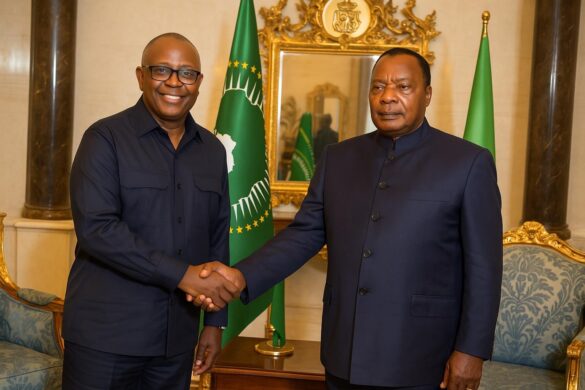Brazzaville Summit Establishes Diplomatic Momentum
The marble halls of the People’s Palace in Brazzaville echoed on October 15th as President Denis Sassou Nguesso welcomed his Bissau-Guinean counterpart, Umaro Sissoco Embaló. Their hour-long meeting, held away from cameras, set the tone for a renewed partnership between the two Atlantic neighbors.
According to a joint statement released after the meeting, the two leaders agreed to establish dedicated working groups that will examine concrete projects in the areas of trade, energy, agriculture, and security. The groups are tasked with delivering an initial roadmap before the end of the first quarter of 2024.
Visa Waiver Strengthens Political Trust
Officials emphasized that the current cooperation is built upon the January 2022 framework agreement signed in Bissau, which lifted visa requirements for holders of diplomatic and service passports. For many analysts, this gesture facilitated official mobility and signaled the political trust that is now translating into sector-specific programs.
The visa waiver was described as “a bridge enabling faster consultations,” while the head of Bissau-Guinean diplomacy called it the “cornerstone of a larger structure” aimed at connecting Lusophone and Francophone west-central Africa.
Trade and Investment Priorities Expand
Bilateral trade remains modest, barely exceeding $18 million in 2022, according to figures from the Congo Trade Promotion Agency. Both governments believe that untapped forest resources, fishing products, and light manufactured goods could quickly double this volume once logistics corridors and customs procedures are streamlined.
The idea of a joint business forum, to be held in Pointe-Noire early next year, emerged during the Brazzaville talks. Organizers aim to connect Congolese timber processors with Bissau-Guinean cashew exporters and showcase opportunities in port services, digital payments, and vocational training.
The complementarity is real. “Congo has deep-water facilities and an energy surplus; Bissau has agricultural niches and ocean access to northern Atlantic routes. Together, they can build regional value chains.”
Energy and Mining Cooperation Ambitions
Hydrocarbons dominated the closed-door part of the discussions. Congo, which currently produces about 267,000 barrels per day, wants to attract Bissau-Guinean investment funds in its upcoming offshore licensing round, while offering the expertise of its state-owned SNPC to help Guinea-Bissau audit its own nascent oil potential.
The two presidents tasked their energy ministers with reviving a 2015 memorandum on sharing geological data. Analysts say such cooperation could facilitate joint bids for seismic studies, reducing exploration costs at a time when African producers are seeking to balance energy security and climate commitments.
Mining was also at the forefront. The Zanaga iron ore project in Congo and Guinea-Bissau’s untapped bauxite reserves offer opportunities for technical exchanges on rail transport and community engagement. Sources close to the
